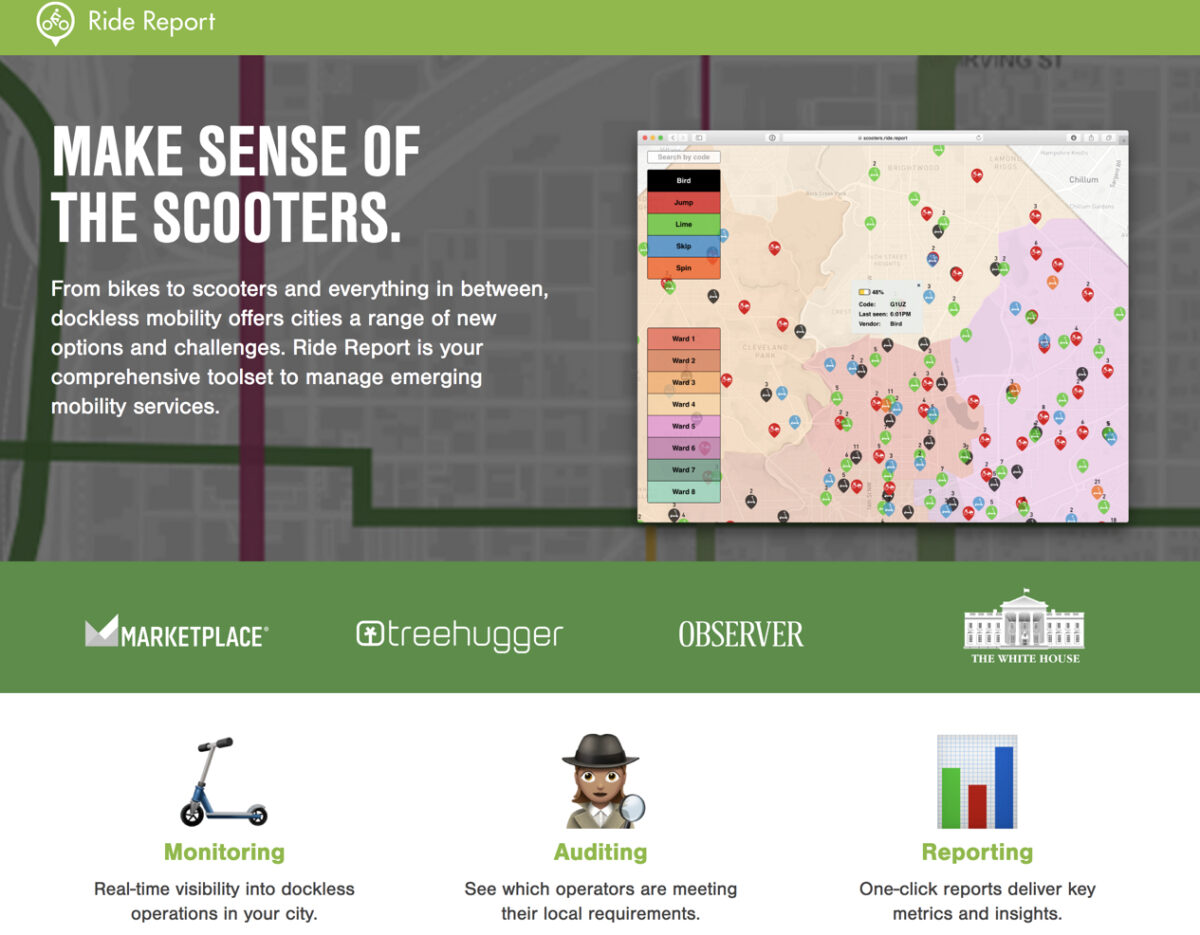
When we first profiled Knock Software in 2015 we said their small device that counts bicycle traffic would “change planning forever.”
Nearly four years later that device is no longer part of their business, but the company itself has more than lived up to the headline.

(Photo: Jonathan Maus/BikePortland)
Knock, makers of the Ride Report app and a transportation data dashboard used by cities, just completed a $2.6 million funding round and has raised $3.4 million since the start of this year. The $2.6 million comes from three Bay Area funders including: Better Ventures, a social impact fund based in Oakland; the Urban Innovation Fund; and San Francisco-based Homebrew. The other $800,000 came from individual angel investors.
For a company that never sought outside funding prior to 2018, Knock is on a very exciting new trajectory.
According to Ride Report CEO and Co-founder (and recent Alice Award recipient) William Henderson, the electric scooter revolution has also revolutionized his business.
“We’re signing up 1-2 cities per week right now. It’s an insane pace and what’s cool is that we have an awesome team.”
— William Henderson
From their first experience working with the City of Portland to measure bike traffic on SE Clinton Street in 2015, Henderson and co-founder Evan Heidtmann noticed a growing gap between cities and tech companies.
As arterial streets clogged during rush-hour, apps like Waze and Google Maps were directing drivers onto Clinton Street. This caused a lot of concern and stress for bicycle users. Henderson’s theory was that the algorithms used by Waze and Google favored Clinton because it lacked stop signs (done to encourage biking) and it had the highest average driving speeds. To solve the problem, PBOT had to do a traffic study and eventually installed a series of median diverters.
“The big lesson for me,” Henderson shared on the phone this morning, “Was that a tech company can simply tweak its algorithm and it breaks our transportation system. That’s crazy.” It was a precursor to a growing issue many cities have faced the past few years: they can’t keep up with high tech corporations. “Cities get caught off-guard,” he continued. “We see that again and and again with companies like what Uber and Lyft did with ride-hailing. They have tons of control and can tweak their algorithm… they don’t share data on things like surge pricing which can dictate how many people use their service, and the city has no say where pick-up and drop-offs can occur.”
The arrival of dockless bike share and e-scooters have turned the demand for real-time data and analysis up to 11.
Henderson now realizes that “The need for data transcends just counting traffic.” He believes when cities have better access to data, they have more power to make sure these new technologies are deployed in a way that aligns with their values. Combine data with real feedback from users via the Ride Report app and you have an even more powerful combination.
Advertisement
“Cities are launching scooters and have no idea where they are, how many are on the street, and how many are in compliance with regulations.”
— William Henderson
Cities that got brow-beaten by companies like Uber and Lyft with ride-hailing are taking a much stronger stance against scooter companies. Knock had seen solid demand for its data dashboard for cities that included traffic counts, user data from the Ride app, and data from open-source mapping engines. Then they brought scooter data into the mix and were flooded with business.
“Cities are launching scooters and have no idea where they are, how many are on the street, and how many are in compliance with regulations. They just don’t have that type of data.” Knock’s Micromobility Dashboard changes that equation and gives cities real-time access to scooter and bike share data. If you’re a PBOT staffer and need to see if a company has 20 percent of their fleet in east Portland, you don’t have to rely on the company’s word. You can just pull up the dashboard and check.
“Now we have a product that appeals to a very acute need, and overnight we started seeing much much faster sales,” Henderson said.
City contracts that had taken 1-3 years to set up, suddenly happened “In a matter of days.” “When we saw that,” Henderson said, “We thought, wow, we have something.”
With fast growth and a product he believes in, Henderson sought outside investors to stay ahead of the competition and build a successful company. He believes Ride Report can play a key role in being a facilitator between transportation-focused tech companies and cities. The way he sees it, private companies might want people to cycle and scoot, but they won’t be thinking about things like equity, Vision Zero, good connections to transit, and so on. “Those are things a city can manage, but only if they have these data tools because technology companies move fast and regulation cycles don’t.”
In addition to their expertise in combining traffic data into good planning decisions, Ride Report’s niche is in being a bridge between the often very different — and increasingly divisive — worlds of local governments and technology companies.
He’s also very optimistic about what micromobility can bring to cities. “This is what we love and this is the real opportunity to grow our business and to show that the scooters can be a positive thing were cities are in control and can manage the public benefit.” It’s Henderson’s view that if scooters are managed well they could be, “The best thing that ever happened for biking in Portland,” as the companies behind them become proponents for infrastructure investments that keep vulnerable users (their customers) safe and make trips as convenient and efficient as possible.
Ride Report’s data dashboards are free for cities to use. They pay when they want more specialized analysis and customizations. Currently 20 cities use the dashboard and 13 are utilizing paid services. But that list is growing fast. “We’re signing up 1-2 cities per week right now. It’s an insane pace and what’s cool is that we have an awesome team.”
On that note… Ride Report plans to do a lot of hiring, especially urban planners and customer support staff. If you’re interested, keep your eye on our Job Listings. Learn more about the company at Ride.Report.
— Jonathan Maus: (503) 706-8804, @jonathan_maus on Twitter and jonathan@bikeportland.org
Never miss a story. Sign-up for the daily BP Headlines email.
BikePortland needs your support.

